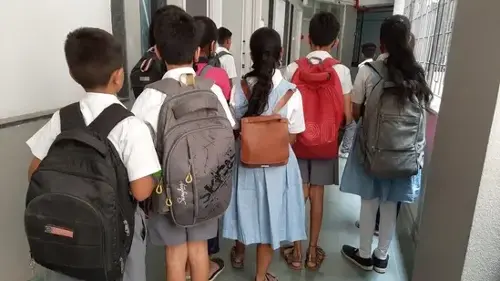
The school leaving exam, whether it is 10th boards in some states or 12th in others, has been a milestone event in the lives of generations of Indians. Families would go to great lengths to ensure that the child is not distracted, like switching off the TV for the entire year, not taking vacations or not entertaining guests.
But as a parent of a student whose school leaving exams are underway, I am unable to whip up the same level of gravitas, because changes in higher education in recent times have left students, parents and teachers puzzled about the importance of the board exam. The 12th boards were critical because the results would determine which college you got admission to. However, with the introduction of the Common University Entrance Test (CUET) housed under the National Testing Agency since 2021, the 12th boards performance has become irrelevant.
One only needs to get minimum qualifying marks required by the higher educational institute one is eventually admitted to, which is usually 45-50%. Scoring these marks doesn’t require burning the midnight oil, so students prefer to prepare for entrance exams than do schoolwork and barely even attend classes. The elephant in the room that needs to be addressed is--why should students care about their performance in 12th boards anymore?
Ironically, it holds great importance only for the tiny slice of well-heeled Indians who are planning to go abroad for their undergraduate studies because the universities in the west use it as an indicator of academic calibre. For the vast majority aiming to study in India, the 12th marksheet, once a revered document, is now just another ID proof.
Meanwhile, teachers are maladjusted to the new reality. Affronted by the lackadaisical attitude of students towards assignments and tests they berate them about non-submission of work and poor attendance.
Wading through all this mess, when students step into the world of entrance exams, there are other curveballs awaiting them.
The National Eligibility cum Entrance Test (NEET) 2024 leakage was only the latest among a long line of such fiascos. New reports have tracked down as many as 70 paper leaks in the past decade from competitive exams to state high school exams across UP, Gujarat, Telangana, Rajasthan, Tamil Nadu and Bihar. Re-exams have been held months later, if at all, crushing the morale of aspirants.
Though leakage is perhaps the most high-profile and impactful failure of the competitive exam process, there are other ways in which competitive exams are flawed. The exam paper, at times, has stark errors, typos and misprints, confusing students who waste precious time trying to figure things out. The recently held Common Law Admission Test (CLAT), taken by an estimated one lakh students, is a case in point. Angry comments on social media asked the Consortium of Law Schools, the body that conducts CLAT, how hard it was for erudite legal minds to frame 120 correct questions over a year. Multiple cases against the Consortium were filed and pending a decision by the courts, candidates hang in limbo.
The intensely competitive JEE Mains held in January 2025, was shown to have a record number of incorrectly framed questions, hurting the credibility of the National Testing Agency.
For youngsters, a public exam is their first brush with the ‘system’. They trust the process and assume that the establishment will function as it should. When it doesn’t, it is a huge jolt and seeds of cynicism about the country, and their own future in it, are sown early.
Nearly one third of the population is between the ages of 15-29 in India. They are part of the precious demographic dividend, which is supposed to give us the competitive edge to become Viksit Bharat by 2047. However, starting from high school right up to selection exams for jobs, the systems that this group must encounter are designed to frustrate rather than nurture their talent. Policymakers need to stand at the vantage point of a young person in contemporary India and make structural changes to smoothen the road from high school to employment.
This article is authored by Vandana Vasudevan, visiting fellow, Centre for Social and Economic Progress (CSEP), New Delhi.